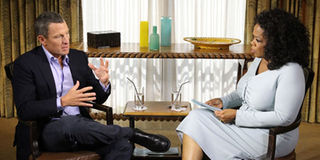Armstrong set to focus on victims of his lies

PHOTO | HARPO STUDIOS, INC | GEORGE BURNS This file photo released by Oprah Winfrey Network on January 15, 2013, shows Oprah Winfrey interviewing Lance Armstrong.
What you need to know:
- World Anti-Doping Agency president John Fahey told Fox News Australia that Armstrong's confession was a "controlled public relations" stunt that only confirmed the details a US Anti-Doping Agency (USADA) probe had revealed
- Such a revelation might be the only way Armstrong can see a reduction in a life ban on sports that fall under WADA jurisdiction, including triathlon, which Armstrong turned to after cycling only to be banned after USADA's doping investigation was made public
LOS ANGELES
The harm that Lance Armstrong caused his family, sponsors and fellow cancer survivors by years of lying and denials of doping will be revealed Friday in part two of his interview with Oprah Winfrey.
The disgraced American cyclist, a seven-time Tour de France winner before those victories were stripped from him after a mountain of evidence unveiled his cheating, confessed to doping in part one of the interview on Thursday.
Winfrey, chosen by Armstrong to conduct the exclusive interview, ensured a double ratings boost for her OWN cable channel by breaking the video into two parts, but the broadcast failed to win much sympathy for the fallen icon.
Clips showed Armstrong would in the second part talk about his future, how his family had to face the truth about his conduct, his reaction when sponsors dropped him and the most humbling moment of his epic fall from grace.
"I will spend the rest of my life trying to earn back trust and apologize to people," Armstrong said in part one of the interview, which was watched by an estimated 3.2 million television viewers in the United States.
Part one of the face to face confession -- which was also streamed on Oprah.com -- failed to win sympathy for Armstrong who previously withdrew from his role with Livestrong, the cancer charity he founded.
The patients he inspired with his rise from testicular cancer survivor to Tour de France winner from 1999-2005, meanwhile, are dealing with the admission that the cyclist's fairy-tale story was built upon "one big lie".
"They have every right to feel betrayed and it's my fault," he said, but offering few specifics on people involved in his doping program and apologizing in a matter-of-fact manner that his critics said showed no sign of remorse or regret at anything more than being caught.
"We were given a calculated public relations exercise with clearly rehearsed answers," Tour de France director Christian Prudhomme said.
World Anti-Doping Agency president John Fahey told Fox News Australia that Armstrong's confession was a "controlled public relations" stunt that only confirmed the details a US Anti-Doping Agency (USADA) probe had revealed.
Armstrong denied forcing teammates into doping, denied having paid off the International Cycling Union (UCI) to cover up a positive drug test and spoke supportively of Michele Ferrari, an Italian doctor banned for life from cycling for doping links.
Such comments gave little hope that Armstrong would become the ultimate whistleblower and reveal details of others who might have aided his doping.
"If he is sincere in his desire to correct his past mistakes, he will testify under oath about the full extent of his doping activities," USADA chief Travis Tygart said.
Such a revelation might be the only way Armstrong can see a reduction in a life ban on sports that fall under WADA jurisdiction, including triathlon, which Armstrong turned to after cycling only to be banned after USADA's doping investigation was made public.
"You can't dope as he did over the years without help," Prudhomme said. "We (the Tour de France) have long said that a rider shouldn't be the only one to pay the price."
Armstrong has not admitted doping beyond the 2005 Tour, potentially opening a door to having his ban trimmed to eight years to provide reinstatement in 2013. But that would likely require major revelations and Armstrong's credibility as a witness would be far from strong given his years of lies.
The steep financial price that Armstrong has paid since being banned last years is likely to worsen further with his doping admission. He could be forced to return prize money and bonuses obtained from his victories.
He also faces a lawsuit from compatriot Floyd Landis, who was stripped of his 2006 Tour title after a positive doping test, and whose decision to speak out four years later ultimately triggered Armstrong's downfall.
Landis claims Armstrong defrauded the American government when his cycling team took $30 million in sponsorship money from the US Postal Service because the team's success was built upon cheating with performance-enhancing drugs.
Landis was a member of the US Postal squad with Armstrong from 2002 through 2004.




